On some University of Exeter courses there is the option to take a professional placement, where students can gain valuable experience with an organisation relevant to their degree. Below we hear from Sophie Armitage, now in her final year of her BSc Zoology course, who decided to undertake a professional placement with Plymouth Marine Laboratory (PML). Sophie discusses her experiences working on a plastics and machine learning project, which was recently published.
Author: Sophie Armitage
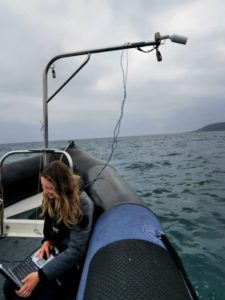
After spending my first two years of university in and out of lockdowns, I decided to take a placement year to try and gain some more practical experience. A placement year is a brilliant opportunity to obtain skills and learn more about your industry of interest, with both the financial support of being a student and the protection of being part of a university.
I spent my placement year at the Plymouth Marine Laboratory (PML), a marine research organisation based in the South-West. Whilst at PML I worked on a project which aimed to create a standardized, automated approach to collecting in-situ data of floating marine macroplastics. These observations are very limited in current literature and often involve costly and labour-intensive methods. Our approach used a trained Artificial Intelligence (AI) model which was able to recognise and classify the different types of marine plastic captured in images shot by a boat-mounted video camera. The overall aim of this project is to increase the number of in-situ floating macroplastic observations to support the validation and development of remote sensing methods. These methods could subsequently be used to further our understanding of the global abundance and distribution of marine plastic debris.
Whilst searching for possible placements I was firstly interested in working abroad, however most of the opportunities I found at the time were limited due to COVID-19 and were very costly. To avoid this, I contacted PhD students and researchers in my area of interest which led to me finding work experience. This involved a significant amount of perseverance as a large proportion of my emails weren’t answered. Despite this, I would highly recommend using this approach to find work experience as it can lead to some amazing opportunities. I found the Plymouth Marine Laboratory when looking at marine research industries in the South-West. Having seen the wide variety of exciting and influential research at PML, I was eager to get involved. After sending out numerous emails to scientists at PML I received an offer to work on this project.
During my time at PML I had the amazing opportunity to work on every step of the project, starting in the planning stages all the way through to writing the scientific paper. I spent my first month at PML researching and learning more about machine learning and remote sensing. Both topics were very new to me, so I had a lot to learn. To aid this process PML sent me on a week-long NEODAAS Earth Observation and Machine Learning training course. This was an incredible opportunity to meet scientists from around the world who had a similar interest and to understand my project further.
I was also sent on a sea survival course so that I could go out to sea on PML’s vessels: the Quest and the Explorer RIB. Next, I worked on developing and testing methods to collect footage which we would use for training and testing our machine learning model. To achieve this, I worked in collaboration with a local software engineering firm called Marine AI. The team has developed and created the impressive Mayflower Autonomous Ship (MAS), which recently crossed the Atlantic. We hoped our algorithm could be used on that crossing, so most of our data used to train our model was collected on the MAS prior to its departure and whilst it was moored. Data was also collected on the PML’s RIB, which allowed us to go out to sea and record macroplastics. After all our footage was collected and labelled, I spent the next few months converting our data into the right format for training the machine learning model using Python. This stage of the project was the most challenging for me as I had no previous Python experience. Therefore, I had a huge learning curve to overcome, which was sometimes very overwhelming. However, I had a great team who were very patient and always went above and beyond to teach me as much as possible and support me throughout the project.
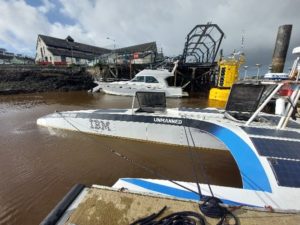
Once our data was in the right format we could then train and test our machine learning model. Our model was able to successfully detect the presence of plastics with an accuracy of 95% and could differentiate between plastic object types with an accuracy of 68%. This was a great achievement and meant we could publish our results. Writing my first scientific paper felt very exciting and also very challenging. On reflection, this process was made so much easier because I had deliberately ensured I had a record of the details of the methods I was using throughout the project. This, alongside the training I received from Exeter University in my first and second year, helped me overcome this demanding task. The final version of our paper was published by the journal Remote Sensing, which can be found here: Remote Sensing | Free Full-Text | Detection and Classification of Floating Plastic Litter Using a Vessel-Mounted Video Camera and Deep Learning | HTML (mdpi.com). I responded to my supervisor’s encouragement to be involved with the whole process of publishing a paper, from picking a journal, submitting it and replying to peer reviewers’ comments. This was an amazing opportunity, which led to me learning a huge amount which will hopefully benefit me in my final year.
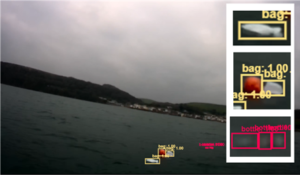
Once our paper was published, we received some media attention. This meant I had the incredible opportunity to be interviewed by BBC Devon and Times Radio, as well as have our project featured on BBC Spotlight.
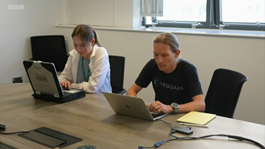
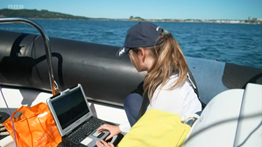
During my placement year, I learnt a huge number of not only academic skills but also life skills. For instance, I learnt the value of seizing as many opportunities as possible. This allowed me to work within other departments such as the microplastic department, where I gained vital lab experience and in the ecology department where I was able to gain some more fieldwork experience during benthic surveys. By doing this I was not only gaining a wider variety of new skills and experiences, but also expanding my network. During my placement year I also massively improved my communication skills and confidence from having to communicate my work with other scientists and to the general public during the media coverage. This experience allowed me to learn new skills which go beyond what can be learnt in a classroom and I am very grateful and proud of what I achieved.
Advice I would give to other students:
• When looking for placements try emailing students/researchers in your area of interest. To do this you can create a general email in the style of a cover letter explaining who you are, what you are hoping to gain from your placement year, why you want to work for that specific company/industry and what skills and experience you can bring to the company. You can always speak to Career Zone, tutors and placement leads for advice on how to do this.
• Try not to be too disheartened by rejections. It is very hard to find work experience and sometimes it takes a lot of time and rejections until you find the right fit, especially in such a competitive industry like marine biology. For example, I didn’t find my placement until the end of August and I had been looking for one since December.
• Once on your placement volunteer for as much as possible; this will not only impress your employer but can lead to some invaluable learning and experiences. For instance, originally it was not planned for me to have such an involvement in the whole process of my project, to be doing any Python or writing the paper. However, I volunteered for as much as I could while at PML, which led to me having an amazing experience.
